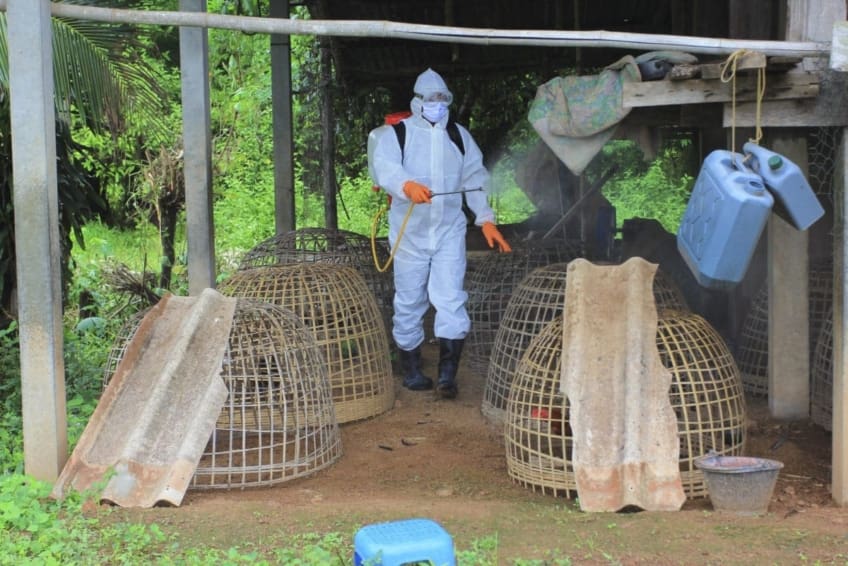
What is avian flu?
Avian flu (also called Avian influenza A or bird flu) is a virus that is spread from bird to bird. In rare cases, certain strains of the virus can transform into a human virus and spread to people. Most people who get infected with bird flu have close contact with infected birds or bird droppings. It is mostly a problem in Asia, Africa, the Pacific, the Middle East, and parts of Europe.
Symptoms of avian flu
Symptoms usually appear 2 to 7 days after exposure. They are similar to what you experience with seasonal flu. Common symptoms include:
- Fever
- Sore throat
- Cough
- Achy muscles
- Headache
- Pink eye (conjunctivitis)
More serious symptoms can include:
- Severe respiratory problems (shortness of breath, trouble breathing, pneumonia, serious respiratory distress, and respiratory failure)
- Abdominal pain
- Nausea and vomiting
- Diarrhea
In some cases, avian flu can cause mental confusion and seizures. At its worst, it can lead to death.
As with any flu virus, some people have higher risk of developing a serious illness. These include:
- Pregnant women
- People with weakened immune systems
- Seniors age 65 or older
What causes avian flu?
The disease is mainly caused by direct contact with an infected bird. This could be through touching or plucking. It is also caused by contact with an infected bird’s saliva or its droppings. This includes swimming in water contaminated with bird droppings. It can also spread if you touch the surface of where an infected bird has been.
The virus spreads when your contaminated hands touch your nose, eyes, or mouth. The virus can also be inhaled through small moisture droplets or dust particles. It can only be passed from human to human if it transforms into a human flu virus. This is rare.
It is also possible to get the virus from undercooked meat or eggs from infected birds. Meat should be cooked to an internal temperature of 165° F. Eggs should be cooked until the whites and the yolks are firm.
Your risk of getting bird flu is higher if:
- You work with poultry.
- You travel to areas where the virus is present.
- You touch an infected bird.
- You go into a building that has infected birds or droppings from infected birds.
- You eat raw or undercooked meat or eggs from infected birds.
How is avian flu diagnosed?
Avian flu is commonly diagnosed during a visit to the doctor. Your doctor will examine you and ask you questions about your symptoms. They will ask you about recent events that may have put you in contact with a contaminated bird or human. Lab tests are needed to confirm the virus. Your doctor will take a sample of mucus from your nose or the back of your throat with a long cotton swab. That swab will be sent to the lab for testing.
Can avian flu be prevented or avoided?
The best way to avoid the virus is to avoid direct contact with birds in high-risk areas. This includes when traveling to the countries most affected and visiting live-animal markets. Avoiding contact with a human known to have the virus also is a good way to avoid illness. As with all viruses, regular hand washing is the best way to control your exposure. If you can’t wash your hands, use hand sanitizer with at least 60% alcohol. Avoid touching your eyes, nose, and mouth with your hands. If possible, use a tissue to cover a cough or sneeze.
If you know you have the disease, do not expose others at work, school, and the community. Try to separate yourself from the rest of your family at home. People who work with live poultry should follow their work safety guidelines.
Because Avian flu is rare, a vaccine to prevent it is not available to the public. However, the Centers for Disease Control and Prevention (CDC) developed a vaccine they are storing in case the disease becomes widespread in the U.S.
Avian flu treatment
Some antiviral prescription medicines can lessen or shorten the symptoms of the virus. However, they won’t prevent or eliminate the virus. Doctors treat the symptoms by recommending over-the-counter medicines, extra fluids, and rest. For more serious symptoms, you may need to stay in the hospital. Hospitalization could involve intravenous fluids (given through a small needle inserted into your vein) and breathing treatments.
Living with avian flu
Living with avian flu may mean a week or two of living with mild symptoms that get better over time. Rest and fluids will help.
Questions to ask your doctor
- Should I be concerned about catching avian flu if I plan to travel to one of the affected countries?
- Can you catch avian flu from cooked poultry?
- How do you tell avian flu apart from normal, seasonal flu?
- Is avian flu more serious for young children and older adults?
![]()
Copyright © American Academy of Family Physicians
This information provides a general overview and may not apply to everyone. Talk to your family doctor to find out if this information applies to you and to get more information on this subject.






